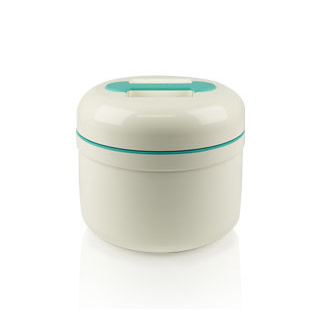Probiotic lassi – ayurvedic fitness drink for a healthy gut
In Ayurveda, maintaining a healthy gut is fundamental for our well-being. This finding is increasingly being supported by scientific studies and is also gradually gaining acceptance in academic medicine.
We can support our gut with probiotic foods which contain an abundance of beneficial bacteria and help to rebalance our intestinal flora and keep it healthy.
This article will reveal:
- Why the gut is so important for our health,
- What makes lassi so beneficial as an ayurvedic probiotic,
- How you can make lassi yourself using a simple recipe and
- What you need to consider when preparing it.
The gut is the root system of our body
Ayurveda experts such as Dr. Saurabh Sharma often compare the gut to the root system of a tree: “To grow a healthy tree, you need to feed the roots with fertilizer and nutrients.”
The same can be said of our bodies: if the gut is healthy and our digestion is good, we are able to derive the most benefit from our food and absorb nutrients from the gut which then nourish and strengthen our whole body.
In the words of Dr. Sharma: “Gut and stomach health can be likened to the engine of the body. When the engine is working well, the whole system works well.”
Thus, healthy, complete nutrition can only go so far – if the digestive system is not working well, the best foods cannot offer their full nutritious potential.
The ability to use our food well is largely dependent on our digestive strength (Agni). The stronger our Agni (see notes), the better we are able to absorb goodness from our food, which means that fewer waste products are produced during the metabolism. A healthy digestive system creates Ojas, the last and finest of the seven Dhatus (tissues), which is closely linked to our life energy and causes us to glow from the inside out.
“Ayurveda views our gut as the root system of our body.”
Dr. Saurabh Sharma
Promoting digestive strength (Agni)
According to Ayurveda we can promote our digestive fire (Agni) by:
- Choosing foods according to our dosha type,
- Adapting our diet to the seasons,
- Eating at the right time and in a quiet environment, structuring our meal times around the ayurvedic daily routine and only having our next meal when the previous one has been completely digested and we truly feel hungry,
- Treating our body to simple, wholesome, fresh, probiotic and alkaline foods,
- Using spices and supplements that promote digestion and stimulate the metabolism,
- Avoiding stress and overstimulation, being positive and trying to maintain a healthy work-life balance.

Probiotics – a vibrant boost for gut health
Probiotic foods add live microorganism to our gut which support its bacterial balance. This automatically strengthens our gut microbiome which is so important for our health and digestion and whose significance and promotion have already been discussed in a previous blog post by Dr. Keith Wallace (USA).
Lassi – a proven ayurvedic household remedy for gentle gut care
Ayurveda knows probiotics in the form of so-called “Asavas” and “Arishtas”. The simplest and one of the best ayurvedic probiotics, however, is lassi, also known as takra. It cleanses the gut and promotes digestion. When prepared according to ayurvedic rules, this drink, which is popular and widespread throughout India, contains valuable microorganisms that gently support our digestion and promote digestive strength. It is also very easy to make at home and is suitable for all dosha types. It is therefore well worth drinking lassi on a regular basis.
Lassi is particularly recommended for people who frequently feel bloated or suffer from constipation, or who feel unpleasantly full after a meal. People with a poor appetite and weak digestive fire should definitely also try lassi.

Fundamental differences between lassi & yoghurt
Lassi is made from yoghurt but has completely different, sometimes even opposite, properties (Gunas). Ayurveda considers yoghurt as having a slightly heating quality (Ushna virya) and as difficult to digest. It also describes yoghurt as “Sroto abhishanti”, in other words it blocks the body’s fine channels (Srotas), which carry oxygen, bodily fluids, blood, plasma, etc. In some people this can lead to tiredness and lethargy.
Lassi on the other hand has a cooling effect. It opens the body’s fine channels and promotes our digestive strength. Anyone who drinks lassi on a regular basis will experience this first hand: they sleep better and feel more energetic and enthusiastic.
The secret behind this transformation lies in how it is prepared. In Ayurveda this is called “Sanskaro hi gunantardhanam”. It means that the quality of food changes as a result of specific processing. This is exactly what happens when we prepare lassi from yoghurt according to traditional ayurvedic rules.
| Yoghurt | Lassi |
| Slightly heating | Cooling |
| Tends to be difficult to digest | Supports digestion |
| Blocks the body’s fine channels (Srotas) | Opens the body’s fine channels (Srotas) |
| Can cause tiredness and lethargy | Makes us feel fresh and energetic |
Traditional basic recipe for probiotic lassi
To make fresh lassi, take:
- 1 part fresh yoghurt
- 4 parts lukewarm water
Combine in a mixer or with a whisk until frothy.
Remove the frothy top layer and filter the rest. A clean cotton cloth is ideal for this but you can also use a fine sieve. Then add spices such as Vata Churna.
Your probiotic lassi is ready!
The froth contains fat so we remove it to make the lassi lighter and easier to digest.
This is why we filter the lassi. The consistency is identical to that described in the authentic recipes.
10 tips for your perfect lassi
We have put together 10 tips for you so that you can get the most benefit from your lassi.
- Choosing your yoghurt
The best base for your ayurvedic lassi is a probiotic organic natural yoghurt.
- The fresher the yoghurt the better
Because the properties of yoghurt change over time, it should be as fresh as possible. This is easy if you use a yoghurt maker and probiotic cultures to make your own yoghurt. It doesn’t get fresher than that! Once it has been prepared, the yoghurt can be kept for 1 or 2 days and used to make lassi. - The ideal proportions
In literature, including on our Website, you will find recipes with different proportions of yoghurt and water. According to “Bhavprakash Nighantu”, a ratio of 1:4 is optimal, as this dilutes the lassi and makes it very easy to digest without weakening Agni. - The optimal temperature
You should always use lukewarm water to make your lassi! Please also note that Ayurveda recommends against using yoghurt for cooking.

- The right time
For best results, you should drink lassi regularly throughout the day, not including evenings, and ideally every day. - Fresh preparation
For greatest benefit you should prepare your lassi, whenever possible, right before drinking it. If, for practical reasons, this is not possible, for example because you are travelling, you should drink your lassi within 2-3 hours of preparation. - Vata Churna – an authentic addition to your lassi
You can make your probiotic drink even more beneficial by adding half a teaspoon of Bio Vata Churna to your glass of lassi. - Individual spices
Of course you can individually vary the herbs and spices used in your lassi. Depending on your dosha type, Agni and taste, small amounts of grated ginger, ground cumin, cardamom, and a little Himalayan salt or ayurvedic rock salt may be used. - Dairy free: vegan milk alternatives
There are also plenty of tasty vegan lassi recipes.
According to Ayurveda, lassis made from almond, rice or soya milk have different qualities and don’t have the benefits of a lassi made from yoghurt. However, they still support the digestion and offer a healthy alternative. - Lassi and food supplements
Lassi is also recommended in combination with specific food supplements such as Digest Special.
We hope you have fun experimenting and wish you all the very best for your (gut) health.
Your Maharishi Ayurveda Team
Thank you to our experts Dr. Richa Shrivastava and Vaidya Dr. Saurabh Sharma for your expert support!

